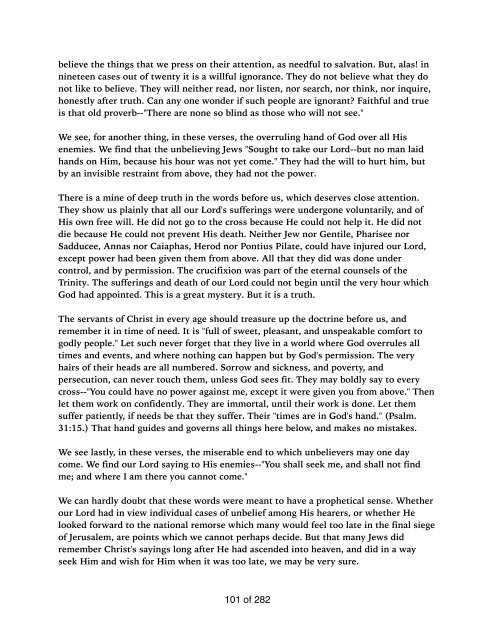The Gospel of John By J.C. ryle
Expository Thoughts on the Gospels Volume 4: John. Ignorance of Scripture is the root of every error in religion, and the source of every heresy. To be allowed to remove a few grains of ignorance, and to throw a few rays of light on God's precious word, is, in my opinion, the greatest honor that can be put on a Christian.
Expository Thoughts on the Gospels Volume 4: John. Ignorance of Scripture is the root of every error in religion, and the source of every heresy. To be allowed to remove a few grains of ignorance, and to throw a few rays of light on God's precious word, is, in my opinion, the greatest honor that can be put on a Christian.
Create successful ePaper yourself
Turn your PDF publications into a flip-book with our unique Google optimized e-Paper software.
elieve the things that we press on their attention, as needful to salvation. But, alas! in<br />
nineteen cases out <strong>of</strong> twenty it is a willful ignorance. <strong>The</strong>y do not believe what they do<br />
not like to believe. <strong>The</strong>y will neither read, nor listen, nor search, nor think, nor inquire,<br />
honestly after truth. Can any one wonder if such people are ignorant? Faithful and true<br />
is that old proverb--"<strong>The</strong>re are none so blind as those who will not see."<br />
We see, for another thing, in these verses, the overruling hand <strong>of</strong> God over all His<br />
enemies. We find that the unbelieving Jews "Sought to take our Lord--but no man laid<br />
hands on Him, because his hour was not yet come." <strong>The</strong>y had the will to hurt him, but<br />
by an invisible restraint from above, they had not the power.<br />
<strong>The</strong>re is a mine <strong>of</strong> deep truth in the words before us, which deserves close attention.<br />
<strong>The</strong>y show us plainly that all our Lord's sufferings were undergone voluntarily, and <strong>of</strong><br />
His own free will. He did not go to the cross because He could not help it. He did not<br />
die because He could not prevent His death. Neither Jew nor Gentile, Pharisee nor<br />
Sadducee, Annas nor Caiaphas, Herod nor Pontius Pilate, could have injured our Lord,<br />
except power had been given them from above. All that they did was done under<br />
control, and by permission. <strong>The</strong> crucifixion was part <strong>of</strong> the eternal counsels <strong>of</strong> the<br />
Trinity. <strong>The</strong> sufferings and death <strong>of</strong> our Lord could not begin until the very hour which<br />
God had appointed. This is a great mystery. But it is a truth.<br />
<strong>The</strong> servants <strong>of</strong> Christ in every age should treasure up the doctrine before us, and<br />
remember it in time <strong>of</strong> need. It is "full <strong>of</strong> sweet, pleasant, and unspeakable comfort to<br />
godly people." Let such never forget that they live in a world where God overrules all<br />
times and events, and where nothing can happen but by God's permission. <strong>The</strong> very<br />
hairs <strong>of</strong> their heads are all numbered. Sorrow and sickness, and poverty, and<br />
persecution, can never touch them, unless God sees fit. <strong>The</strong>y may boldly say to every<br />
cross--"You could have no power against me, except it were given you from above." <strong>The</strong>n<br />
let them work on confidently. <strong>The</strong>y are immortal, until their work is done. Let them<br />
suffer patiently, if needs be that they suffer. <strong>The</strong>ir "times are in God's hand." (Psalm.<br />
31:15.) That hand guides and governs all things here below, and makes no mistakes.<br />
We see lastly, in these verses, the miserable end to which unbelievers may one day<br />
come. We find our Lord saying to His enemies--"You shall seek me, and shall not find<br />
me; and where I am there you cannot come."<br />
We can hardly doubt that these words were meant to have a prophetical sense. Whether<br />
our Lord had in view individual cases <strong>of</strong> unbelief among His hearers, or whether He<br />
looked forward to the national remorse which many would feel too late in the final siege<br />
<strong>of</strong> Jerusalem, are points which we cannot perhaps decide. But that many Jews did<br />
remember Christ's sayings long after He had ascended into heaven, and did in a way<br />
seek Him and wish for Him when it was too late, we may be very sure.<br />
101 <strong>of</strong> 282

















